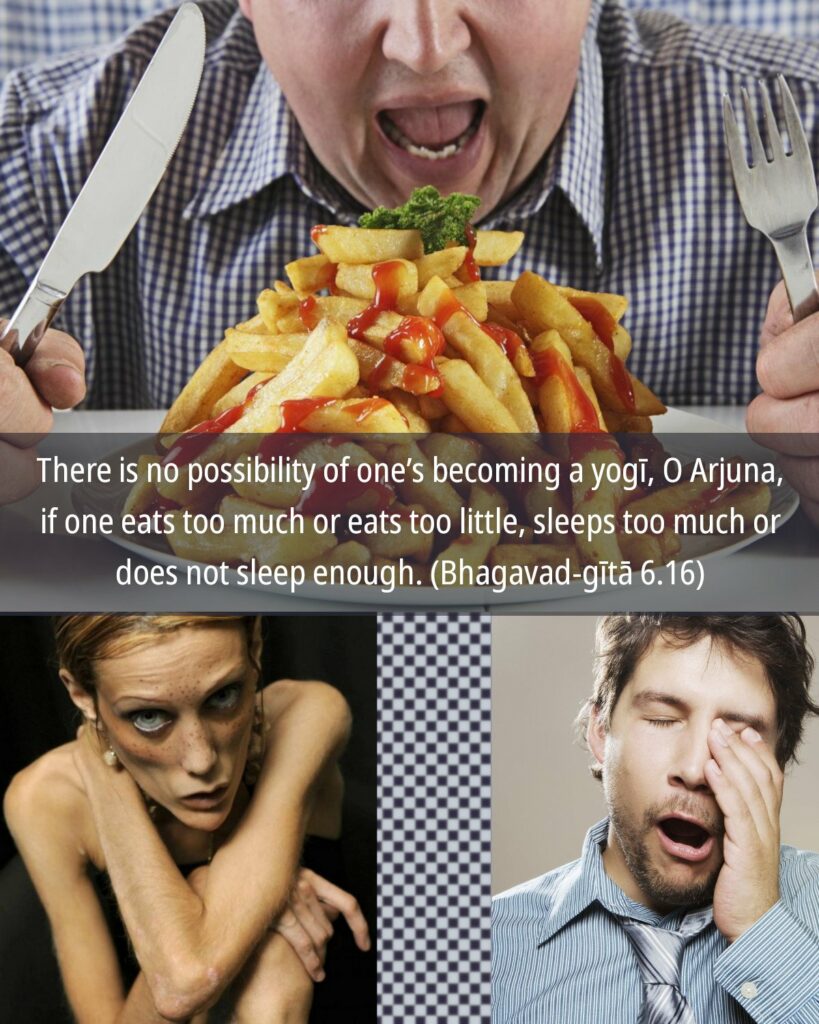नात्यश्नतस्तु योगोऽस्ति न चैकान्तमनश्नत: |
न चाति स्वप्नशीलस्य जाग्रतो नैव चार्जुन || 16||
nātyaśhnatastu yogo ’sti na chaikāntam anaśhnataḥ
na chāti-svapna-śhīlasya jāgrato naiva chārjuna
na—not; ati—too much; aśhnataḥ—one who eats; tu—however; yogaḥ—Yog; asti—there is; na—not; cha—and; ekāntam—at all; anaśhnataḥ—abstaining from eating; na—not; cha—and; ati—too much; svapna-śhīlasya—one who sleeps; jāgrataḥ—one who does not sleep enough; na—not; eva—certainly; cha—and; arjuna—Arjun
Translation:
O Arjuna! Verily, yoga is not for one who eats too much or who does not eat at all, nor for him who sleeps too much or who does not sleep at all.
Commentary:
Moderation in food and sleep is the condition of yoga for all seekers whatever path they follow. In Dhyana Yoga particularly, it is of very great importance. Unless the body is light and strong, meditation is difficult to practise. So, regulation of food and sleep is prescribed as the first condition of yoga. Generally, people think that spirituality is something not connected with the body and what they eat and how they work does not matter. It is not so. The body if not regulated is itself the chief obstacle to spiritual realisation. A sickly body subject to pain binds the mind to itself and its suffering and does not allow it to rise to the plane of thought and meditation. We know that when the body is healthy and strong, the mind becomes free from the bondage of the body and becomes capable of higher thought and imagination. Regulation of the body is therefore emphasised many times in the Gita.
Moderation in sleep is also of great importance. Too much sleep produces ‘tamas’ and all the demonical forces in man find free play in that state. Even so, sleeplessness causes nervous breakdown, and man becomes unfit for any kind of work, much less for Dhyana.
Swami Vivekananda Says —
A yogi must avoid the two extremes of luxury and austerity. He must not fast, nor torture his flesh. He who does so, says the Gita, cannot be a yogi: He who fasts, he who keeps awake, he who sleeps much, he who works too much, he who does no work, none of these can be a yogi.[Source]
The food must be simple and taken several times [a day] instead of once or twice. Never get very hungry. “He who eats too much cannot be a yogi. He who fasts too much cannot be a yogi. He who sleeps too much cannot be a yogi, nor he who keeps awake too much.” He who does not do any work and he who works too hard cannot succeed. Proper food, proper exercise, proper sleep, proper wakefulness — these are necessary for any success.[Source]
The body must be properly taken care of. The people who torture their flesh are demoniacal. Always keep your mind joyful; if melancholy thoughts come, kick them out. A yogi must not eat too much, but he also must not fast; he must not sleep too much, but he must not go without any sleep. In all things only the man who holds the golden mean can become a yogi.[Source]
The explanation of nature is in us; the stone falls outside, but gravitation is in us, not outside. Those who stuff themselves, those who starve themselves, those who sleep too much, those who sleep too little, cannot become yogis. Ignorance, fickleness, jealousy, laziness, and excessive attachment are the great enemies to success in yoga practice.[Source]
“He who has controlled the tongue, has controlled all other senses,” says the Bhagavata. In the early days at Dakshineswar, Latu (Swami Adbhutananda) used to wrestle and had a large appetite. One day he went to a devotee’s house in Calcutta and ate an exceptional quantity of food. The next day in front of the Master that devotee praised Latu’s power of consuming food. Later, the Master told Latu privately: “Look, it is not good to eat excessively by competing with others. During lunch, you may eat as much as you wish; but at night, don’t eat too much.” Latu obeyed his Master’s advice. Gradually he reduced his meals to such an extent that his body became emaciated. The Master observed this and told Latu: “Look, you have gone to the other extreme. Please eat the amount that will keep your body in fit condition. Otherwise, if you eat too little you won’t be able to focus your mind during meditation.” (Source: God Lived with Them)
Question: What conditions are required for yoga?
Answer: Moderation in food and sleep is the first condition of Yoga.
Bhagavad Gita: Chapter 6 🔻 (47 Verses)
